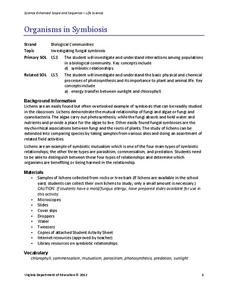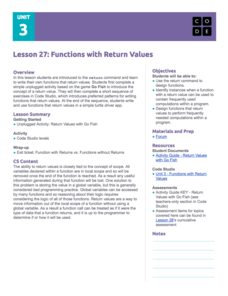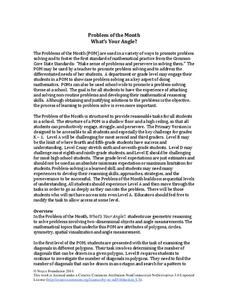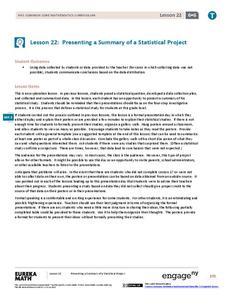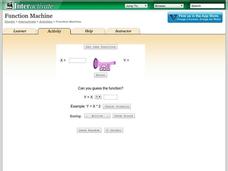Virginia Department of Education
Organisms in Symbiosis
Searching for an activity that allows emerging biologists to explore symbiosis up close and personal? Pupils collect samples and view lichens through a microscope and conclude with a discussion about the relationship they have...
Teach Engineering
Density Column Lab - Part 1
Mass and density — aren't they the same thing? This activity has groups use balance beams and water displacement to measure several objects. The pupils use the measurements to calculate the density of the objects.
Museum of Tolerance
Improving My Community Through Social Action
Action is the heart of change. Encourage class members to not only identify critical social justice issues in their school or community but to take action as well. As individuals or as groups, they research a situation, develop a...
EngageNY
Building Logarithmic Tables
Thank goodness we have calculators to compute logarithms. Pupils use calculators to create logarithmic tables to estimate values and use these tables to discover patterns (properties). The second half of the instructional activity has...
EngageNY
Comparing Quadratic, Square Root, and Cube Root Functions Represented in Different Ways
Need a real scenario to compare functions? This activity has it all! Through application, individuals model using different types of functions. They analyze each in terms of the context using the key features of the graphs.
EngageNY
Graphs of Linear Functions and Rate of Change
Discover an important property of linear functions. Learners use the slope formula to calculate the rates of change of linear functions. They find that linear functions have constant rates of change and use this property to determine if...
University of Colorado
Phases of Charon
Pluto, although no longer considered a planet, has five moons. Pluto's moon, Charon, is the focus of a resource that describes how the moon is viewed from the surface of Pluto. Photos help individuals see how Charon would look at...
University of Colorado
Astro-Chronology
Class members play a version of the game Chronology to determine when certain scientific events occurred in history. Teams play until someone has 5-10 events in the correct order.
Code.org
Functions with Return Values
Young computer scientists explore how to use the return command in computer programing by playing Go Fish. They learn about functions that return values and then write a turtle driver app using the return function.
Intel
Pedal Power
Show your classes the importance of mathematics in something as simple as bicycle design. The final lesson in the six-part STEM series has each group research a different aspect of the bicycle. Learners use mathematical formulas, linear...
Community Colleges of Los Angeles
Seeking Refuge: Understanding Refugees in Canada
What if you had no choice but to leave everything behind and seek asylum elsewhere? Do countries have an obligation to accept refugees? To gain an understanding of the complexity of the issues of refugee rights, class members first...
PBL Pathways
Boogie Boards
Solve a complex business puzzle by building a linear programming model. An engaging project-based learning problem has classes examining transportation costs and manufacturing limitations from several plants. Ultimately, they use their...
Noyce Foundation
What's Your Angle?
Math can be a work of art! Reach your artistic pupils as they explore angle measures. A creative set of five problems of varying levels has young learners study interior and exterior angle measures of polygons. The introductory levels...
EngageNY
Comparing Integers and Other Rational Numbers
The ninth installment of a 21-part module has pupils compare integers and rational numbers in decimal and fraction form. They match stories to number lines and compare values in the stories.
EngageNY
Presenting a Summary of a Statistical Project
Based upon the statistics, this is what it means. The last lesson in a series of 22 has pupils present the findings from their statistical projects. The scholars discuss the four-step process used to complete the project of their...
Shodor Education Foundation
Function Machine
Machines can be so helpful sometimes. A simple interactive has learners enter input values for a function machine and observe output values. These values help determine a function that represents the input-output relationship in the...
Stanford University
Martin Luther King, Jr. and Malcolm X: A Common Solution?
Much has been made of the differences between Martin Luther King, Jr. and Malcolm X. But was there any common ground between them? Class members reconsider what they think they know about these two civil rights leaders with...
Teach Engineering
Solving Energy Problems
Here's your chance to save the world. The eighth lesson in a 25-part Energy Systems and Solutions unit has young scientists come up with ideas for individual or group projects. They identify ways to solve the energy crisis. Hope they...
101 Questions
Bottomless Mug
How much coffee can you actually drink? An intriguing lesson has learners consider an advertisement for a bottomless mug of coffee. While considering the price of the mug, they analyze different scenarios to determine the cost-saving...
Appalachian State University
The Fault in Our Stars: A Movie Study Guide for Eighth Grade Language Arts, Social Studies, and Science
How would you spend your last days with a loved one? The movie guide for The Fault in Our Stars prompts scholars to compare important scenes from the novel to the film and contains background information about the author, guided...
University of North Carolina
Essay Exams
For decades, the sight of blue books has struck fear in the hearts of collegians. Those books usually signal an essay exam, the topic of one of the handouts in a larger series on specific writing assignments. Using the handout, writers...
Glynn County School System
Solar System Formation and Extra-Solar Planets
Has the solar system always been like it is today? A lesson presentation begins with a discussion of the formation of our solar system. It continues with a compare and contrast of the inner and outer planets.
Glynn County School System
Earth's Magnetic Field and the Moon
The surface of the moon has an amazing tale to tell. Learn about the moon's story with a PowerPoint presentation that describes the unique features of the moon's surface as well as explains its movement in relation to Earth.
American Museum of Natural History
Inca Investigation
A fascinating interactive resource lets young archaeologists dig through the history of Huanuco Pampa. The Inca city, located high in the Andes mountains of Peru, was once a thriving community. Craig Morris has spent years researching...
Other popular searches
- 1st Grade Grammar Has/have
- Helping Verbs Have Has
- I Have Who Has
- Have and Has
- I Have Who Has Game
- Using Has and Have
- Have To/has To
- Verbs Has and Have
- Have Got Has Got
- Have Has Had
- Language Has and Have
- Have Got /Has Got
